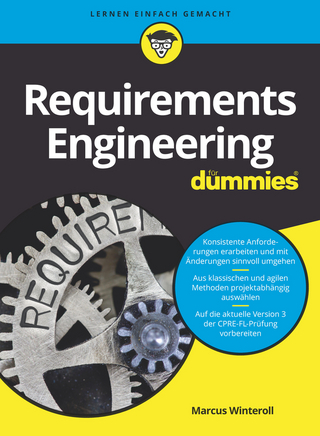
Requirements Engineering: Foundation for Software Quality
Springer International Publishing (Verlag)
978-3-030-98463-2 (ISBN)
The 12 full and 7 short papers presented in this volume were carefully reviewed and selected from 45 submissions. They were organized in topical sections as follows: Artificial intelligence and explainability; machine learning; natural language processing; user stories; business, markets, and industrial practice; and cognition and expression. The special theme for REFSQ 2022 was "Explainability in Requirements Engineering".
Artificial Intelligence and Explainability.- Transparency and Explainability of AI Systems: Ethical Guidelines in Practice.- Requirements Engineering for Artificial Intelligence: What is a Requirements Specification for an Artificial Intelligence.- Quo Vadis, Explainability? - A Research Roadmap for Explainability Engineering.- Machine Learning.- How Effective Is Automated Trace Link Recovery in Model-Driven Development.- A Zero-Shot Learning Approach to Classifying Requirements: Preliminary Study.- Natural Language Processing.- Abbreviation-Expansion Pair Detection for Glossary Term Extraction.- Towards Explainable Formal Methods: from LTL to Natural Language with Neural Machine Translation.- Req2Spec: Transforming Software Requirements into Formal Specifications using Natural Language Processing.- FRETting About Requirements.- User Stories.- Invest in Splitting: User Story Splitting within the Software Industry.- Guided Derivation of Conceptual Models from User Stories: A Controlled Experiment.- From User Stories to Data Flow Diagram for Privacy Awareness.- Business, Markets, and Industrial Practice.- Requirements Engineering in the Market Dialogue Phase of Public Procurement: A Case Study of an Innovation Partnership for Medical Technology.- A Business Model Construction Kit for Platform Business Models - Research Preview.- On Testing Security Requirements in Industry? -- A Survey Study.- Setting AI in context: A case study on defining the context and operational design domain for automated driving.- Cognition and Expression.- Requirements Engineering for Software-Enabled Art: Challenges and Guidelines.- A Study on the Mental Models of Users Concerning Existing Software.- Vision Video Making with Novices: A Research Preview.
| Erscheinungsdatum | 10.03.2022 |
|---|---|
| Reihe/Serie | Lecture Notes in Computer Science |
| Zusatzinfo | XVII, 259 p. 51 illus., 36 illus. in color. |
| Verlagsort | Cham |
| Sprache | englisch |
| Maße | 155 x 235 mm |
| Gewicht | 433 g |
| Themenwelt | Informatik ► Software Entwicklung ► Requirements Engineering |
| Informatik ► Theorie / Studium ► Künstliche Intelligenz / Robotik | |
| Schlagworte | Applications • Automatic Programming • Collaboration in software development • Computer Science • conference proceedings • domain specific languages • Extra-functional properties • Feature Interaction • formal methods • Informatics • machine learning • Model-Driven Software Engineering • object-oriented programming • Requirements Engineering • Research • Software Design • Software design techniques • software development methods • software evolution • software functional properties • software prototyping • Software systems models • system description languages • Traceability |
| ISBN-10 | 3-030-98463-X / 303098463X |
| ISBN-13 | 978-3-030-98463-2 / 9783030984632 |
| Zustand | Neuware |
| Haben Sie eine Frage zum Produkt? |
aus dem Bereich


